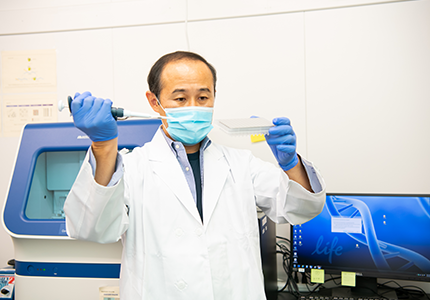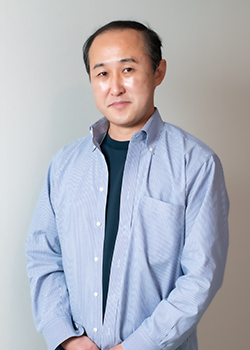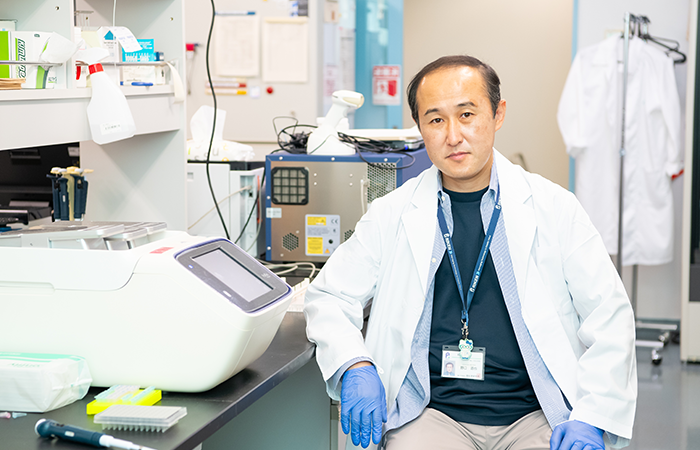Dedicated to Rapidly Advancing Quality Management Initiatives to Connect Diverse Human Resources
BRC is supported by a diverse staff who are involved in a variety of tasks. We have interviewed staff members from each of the 12 laboratories that make up BRC, asking them about their activities and their day-to-day efforts in their research rooms.
This time we are speaking with Michiya Noguchi, a Senior Technical Scientist in the Cell Engineering Division.
He is engaged in quality management for providing a variety of cells to the research community both in Japan and internationally, and also plays a central role in human exchanges that transcend his affiliation within the center. We have asked him to share with us what he finds rewarding about his work and what he is striving to achieve.
The importance and rewards of quality control
The overseas study experiences that became my strengths
RIKEN BRC offers five bioresources, namely laboratory mice, experimental plants, cultured cell lines, genetic materials, and microorganisms. The Cell Engineering Division, to which I belong, collects cells developed by researchers around the world, implements strict quality control, and provides high-quality cell materials with experimental reproducibility to the research community in Japan and overseas.
The field of quality inspection is also rapidly advancing, and by conducting detailed analysis, we are now able to understand even the most minute details that were previously unknown. Different cells can look very similar, so it is difficult to determine what kind of organism a cell is from just by looking at its appearance. When researchers received deposits of cells, they previously had no way to determine in detail which organism the cells came from.
Nowadays, however, with cells of human origin, it is now possible to identify cells from specific individuals, and even in the case of cells derived from other animals, it is relatively easy to determine the species through genetic testing.
Quality inspection of cellular materials that contribute to life science is extremely important. I find it rewarding when I am able to detect cell mix-ups or cell contamination during the inspection process before materials are provided to the research community.
Because our inspection techniques and information are being constantly updated, we will continue working to ensure quality control that allows us to provide the world’s highest quality cellular materials.
Another rewarding experience is when we receive a report from an overseas user to whom we have provided cells informing us that, “The cell culture is not going well,” and we are able to provide them with appropriate feedback that allows them to develop a successful cell culture.
One of my strengths is that I am good at communicating in English, having experienced studying at an American university. My father, who taught at a liberal arts college, told me that it was worth it just to be able to use English, and he strongly urged me to study abroad. I used to be a shy person, and looking back, I am truly grateful that my father encouraged me to study abroad.
I often receive inquiries from Japanese researchers about cell materials and experimental methods, and it gives me great pleasure to be able to share my knowledge and help others. Although I eventually chose a different career path from the one my father had in mind for me, I still feel the influence of my father.

As a child, I aspired to become a police officer.
Now, I try to be “a man who knows the difference” in both professional and private life.
When I was a child, I dreamed of becoming a police officer. I think I longed for a career in which I could help people. As I researched police work, I became interested in forensic investigations such as DNA testing, and I hoped to become a police officer who would conduct these kinds of investigations. When I perform personal identification tests on human-derived cells in the course of my work, I recall those days with deep emotion.
There are a lot of sayings that I take as lessons, such as “Stop and smell the roses,” “Done is better than perfect,” “No chocolate, no life,” and “A man who knows the difference.” That last one in particular, “A man who knows the difference,” has become an important key phrase for me in both my personal and my professional life.
As an important personal mission related to this, I have taken on the task of noticing within 24 hours the days when my wife or my mother-in-law, both of whom live with me, have visited the hair salon. The other day, when I summoned up the courage to speak to my mother-in-law about this, she said, “Well, I haven’t been there today, but…,” so I think it may be easier, in a way, to tell the difference between cells.
BRC’s favorable research environment
Making the most of a diverse workforce
In high school, I was good at studying science subjects including mathematics and physics, and I loved living things, so I went on to major in biology at an American university.
When I was ready to enroll in a master’s degree program in Japan, there were several programs at research institutions that accepted students. Among them, I chose RIKEN, where I would be able to conduct cutting-edge research in my chosen area of study, and I ended up joining RIKEN.
The research environment at RIKEN is very favorable. BRC has a particularly diverse range of bioresources, and the staff include some of the world’s best-known researchers, so it is possible to get a variety of advice from people beyond the laboratory.
It is said that what is required at the research site is a diversity of human resources, but at the same time, in order to make the most of this diversity, I think it is important to create a place where these diverse human resources can understand and collaborate with each other.
At BRC, for the past 10 years, we have been holding the Wakate BRC Conference (WBC) as an opportunity for interdisciplinary exchanges beyond the workplace. This is BRC’s own exclusive networking event, where researchers and administrative staff who normally have no contact with each other can interact across the boundaries of their fields of expertise in order to understand each other’s skills, share information, and improve their skills.

Although the term wakate refers specifically to “young people,” of course participation is open to everyone, and when we added the caveat that “anyone can take part, regardless of age,” with the aim of providing a forum for a wide range of people to interact. We were very pleased to hear that people of all ages, from the young to the elderly, participated in the event and that senior staff members found it easy to participate.
Just like the Seishun 18 ticket for unlimited travel on local trains, which can be used and enjoyed by people of any age, we hope to continue to promote this event as a social gathering that anyone can feel free to attend by making it more widely known.
Profile
- Michiya Noguchi
- Senior Technical Scientist, Cell Engineering Division (RIKEN BRC Cell Bank)
- After working in the Gene Engineering Division at RIKEN BRC, he moved to the Cell Engineering Division in 2009. Currently, as the leader of the Quality Control Department, he is engaged in quality control of all types of cells, and is also actively involved in promoting human exchanges through events at the Center.
Release date : April 23, 2024
